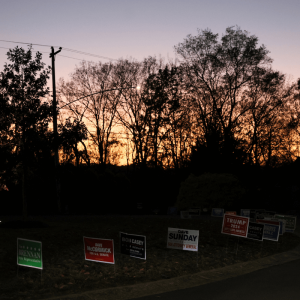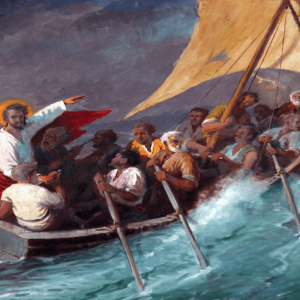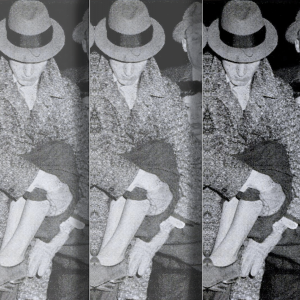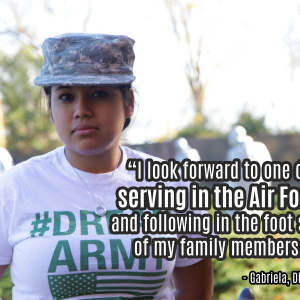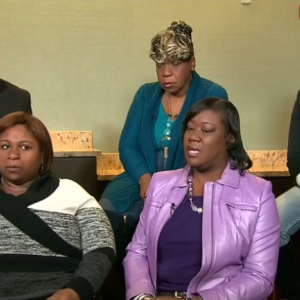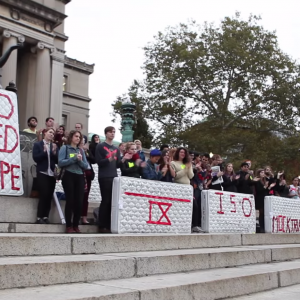
Rev. Kaeley McEvoy is the the fellowship program director and staff chaplain at Sojourners. Formerly she served as associate pastor at Westmoreland Congregational UCC in Bethesda, Md.
A former Sojourners fellow herself, McEvoy is ordained in the United Church of Christ and received her master of divinity degree from Union Theological Seminary in New York City with a focus in interreligious engagement and eco-feminist theology. Her thesis project focused on uplifting the legacy of the Clergy Consultation Service on Abortion and the legacy of protecting reproductive rights in religious spaces. During her time in New York City, she also served at Judson Memorial Church, the Riverside Church, and worked in the New York City Mayor’s office as a community affairs liaison. Her areas of specialty include reproductive justice and eco-spirituality. She received her undergraduate degree at Gettysburg College in Gettysburg, Pa., where she majored in religious studies, writing, and peace and justice studies.
In her spare time, Kaeley enjoys writing poetry, gardening, and playing pick-up soccer. Her personal work and writing has appeared in Sojourners, Red Letter Christians, andThe Washington Post.Kaeley is also committed to the lifelong struggle of anti-racism and serves as a leader in the D.C. chapter of S.U.R.J (Standing Up for Racial Justice) as well as the national SURJ-Faith organizing team.
Raised in Connecticut, Kaeley calls the Mt. Pleasant community of Washington, D.C., home and usually remembers to flip her backyard compost bin. You can find her on Twitter (X) at: @KaeleyMcEvoy
Speaking Topics
- Mutual Aid and Community Creation
- Eco-Theology and Environmental Justice
- Reproductive Health and Justice
- The White Work of Anti-Racism
- Abolition as a Faith-Based Practice
- Joy as a Method of Resistance
Speaking Format
- Workshops
- Keynotes
- Sermons
- Co-create Personalized Rituals
Languages
- English
Past Notable Events
- “Miriam and the Easter Vigil,” Luther Place Memorial Church, Washington, D.C., Spring 2025
- “Yes, We Really Do Mean Abolition,” Cleveland Park United Church of Christ, Washington, D.C., Fall of 2024
- “Let the Tambourines Sing,” Riverside Baptist Church, Washington, D.C., Summer of 2024
- “Disaster Politics,” First Congregational Church, Washington, D.C., Summer of 2024
Posts By This Author
Writing Theology With Dirt Under Your Fingernails
In his new memoir, ‘Good Soil,’ Chu writes about raising chickens, rejuvenating soil, and searching for meaning.
WHEN JEFF CHU left his New York City magazine job to enter seminary, he didn’t expect one of his academic assignments to be dismembering a chicken. But at Princeton Theological Seminary’s “Farminary” (read: part farm, part seminary), learning takes place in nontraditional ways.
In his new memoir, Good Soil, Chu writes about raising chickens, rejuvenating soil, and searching for meaning. His storytelling brings to life the 21-acre farm where Chu and his classmates try to learn what it takes to follow the example of Jesus, once mistaken for a gardener himself (John 20:15).
Chu’s award-winning journalistic prose translates seamlessly to memoir as he shares his experience as a mid-life seminarian. He captures detail in a way that invites readers to practically smell the radishes rotting in the compost bin and easily imagine the playful cast of seminarian farmhands Chu learns beside.
In the early days of Farminary classes, the professors challenge the students to “expect love to grow” alongside the fruits and vegetables. Chu feels skeptical. “I have good friends. I don’t need new friends,” he writes. It is a joy to see Chu’s disillusionment transform into relationship and his skepticism blossom into wonder.
A Prayer After a Turbulent Election
As I’ve thought about what will sustain me in the days ahead, I’ve been heartened to remember that we are not the first people who have struggled to be faithful under the thumb of oppressive leadership. I’ve especially been thinking of the stories in Exodus: Shiphrah and Puah, the courageous midwives who rejected Pharaoh’s demand to murder male children (Exodus 1:15-22), God’s promise to Moses (Exodus 3:12), and Miriam who led her people in song after escaping the confines of slavery in Egypt (Exodus 15:20-21).
A Prayer for Calm Amid an Anxious Election Season
In the synoptic gospels, when the currents swelled and wind howled, Jesus woke up during the storm that threatened the lives of his disciples. Although the disciples questioned his authority and were terribly afraid, Jesus woke from his sleep and settled the waves with the sound of his voice. And even though Jesus scolded them, the disciples were safe and the boat sailed on. As we think about the pending uncertainty of the 2024 election, there’s something reassuring in that story for me: God was present in the storm.
Honest, Joyful Parenting, Even Amid Climate Collapse
In “This Sweet Earth,” Lydia Wylie-Kellermann explores raising children honestly and joyfully in a world on the brink of despair.
LYDIA WYLIE-KELLERMANN HAS a large cemetery in her backyard. There lie “weeds and tulips and a few homemade tombstones ... beloved fish, brutally attacked chickens, stray cats, and two beloved rabbits.” In this cemetery, her two preteen sons, Isaac and Cedar, and wife Erinn Fahey host a lot of funerals. Why? Living during climate collapse means we must face death with dignity.
Approaching mortality with gentleness is just one of many lessons woven throughout This Sweet Earth: Walking with Our Children in the Age of Climate Collapse. Reading the book feels like listening to stories shared by a friend over a glass of sweet tea.
This Sweet Earth is filled with narratives from Wylie-Kellermann’s life as an activist, parent, and watershed-dweller. Every chapter is benedicted by corresponding prayers and blessings, which affirm that Wylie-Kellermann was brought up on a diet of poetry and anti-nuclear pamphlets. Former editor of Geez magazine and daughter of protest prophet Bill Wylie-Kellermann and organizer and writer Jeanie Wylie-Kellermann, Lydia chooses words with precision, power, and a bit of whimsy.
Rose Robinson's Race for Justice
Sixty years before Colin Kaepernick, another athlete refused to stand for the national anthem.
PROPHETS USE WORDS to encourage or condemn. The biblical prophet Micah’s command “to act justly and to love mercy and to walk humbly with your God” (6:8), for example, has rung in the ears of many. Language is a powerful tool for social change. However, some prophets don’t use words at all: They use their bodies.
Social prophets today that use their bodies often stand arm-in-arm in front of police barricades or walk miles for justice. But some prophets have used their bodies in another arena: athletics. And many of these prophets are women.
How many know the story of track and field star Eroseanna (“Rose”) Robinson? Some recall in 2016 when football quarterback Colin Kaepernick took a knee during the national anthem in protest of police brutality and in support of the Black Lives Matter movement. Few remember that in 1959, nearly 60 years before Kaepernick’s action, Rose Robinson refused to stand for the U.S. national anthem at the Pan American Games in Chicago because, to her, “the anthem and the flag represented war, injustice, and hypocrisy,” according to historian Amira Rose Davis. By refusing to stand, Robinson used her body to speak for justice.
But Robinson was a full-time activist on and off the field. Throughout the 1950s in Cleveland, she was a leader in the Congress of Racial Equality, an interracial group of students founded by the Fellowship of Reconciliation that paved the way for nonviolent actions in the U.S. civil rights movement.
Maggie Rogers: A Rock Star in Seminary
‘Surrender’ is testament to what happens when we unclench our jaws and give our emotions room to breathe.
INDIE-ROCKER MAGGIE Rogers says she feels her emotions in her teeth: Anger and love make her gums pulse and jaw tighten. Rogers’ second studio album, Surrender, is testament to what happens when we unclench our jaws and give our emotions room to breathe.
“This is the story of what happened when I finally gave in,” Rogers said in the trailer for Surrender. The result is a cohesive journey through the many questions that plague our grief-stricken culture. Offering both solace and space for unanswered questions, the album, released last summer, is an invitation to dance — to surrender to the coexistence of beauty and suffering in the world.
The Men’s World Cup Is Corrupt. But It’s Also Holy
Christians who appreciate soccer, when we watch the World Cup, are not only celebrating stunning aerial goals but are also learning about sin and evil. The workers exploited for the World Cup, which ultimately is a purely recreational event, need to be mourned. Migrant labor markets all over the world prioritize money over human lives — the United States. We live authentically as people of faith in this corrupt world when we acknowledge sin, challenge the powers that be, and work for change so as to prevent the sin’s recurrence.
On Earth As It Is on the Soccer Pitch
The first-of-its-kind collective bargaining agreement achieved by the USWNT highlights that when women win, we all win.
A YOUNG GIRL sits on her father’s shoulders at a women’s soccer game in California, where fierce women play on the field, wise women own the professional soccer club, and women on the U.S. national team just won the right to be paid equally. The father locks eyes with Abby Wambach, a veteran in the fight for equal pay and a winner of two Olympic gold medals and a World Cup title. The father points up to his daughter and shouts to Abby: “This is the only world she’ll ever know.”
It’s commonplace for institutions to fail to honor a woman’s worth—from rulings in domestic violence cases to recent decisions from the highest courts that restrict reproductive options. But the U.S. Women’s National Soccer Team is not common. And they are not used to losing. The team, which has won four World Cups and four Olympic gold medals, is considered the world’s best women’s soccer team, and yet the players’ efforts to be compensated fairly have been an uphill battle for decades. For instance, under the most recent collective bargaining agreements, a player on the women’s team, according to The Washington Post, would earn about 89 percent of the compensation U.S. men received for a series of exhibition games. That disparity was true in 2018 and 2019, when the U.S. women won the World Cup and the U.S. men failed to qualify for the tourney.
Making Home Life Sacramental Again
Emily M.D. Scott and Anna Woofenden want us to move our hands along with our spirits.
LONG BEFORE the coronavirus inspired congregations to gather outside of a sanctuary, Emily M.D. Scott and Anna Woofenden birthed congregations (St. Lydia’s Dinner Church in Brooklyn, N.Y., and the Garden Church in San Pedro, Calif., respectively) that shed pageantry and focused on the basics: bread, cup, and looking-a-person-deep-in-the-eye connection.
Around a dinner table and in an urban garden, these two scrappy congregations grew through environmental disasters (Hurricane Sandy and a multiyear California drought), confrontations with external and internal classism and racism, and the joys and griefs of bringing a new vision of ekklesia into the world.
It is rare to see the tangled roots of a church plant. Yet, both authors share insecurities about failed worship services, unstable budgets, and the long loneliness that comes with church leadership. The vivid character development, precise detail, and theological depth of both narratives make the reader feel at home in the possibility of worship beyond pew-lined sanctuaries.
There Is No Such Thing as an Apolitical Woman
One of the biggest gleanings from Mrs. America is that women and their motivations for power are complicated and far from monolithic.
The Wisest Person I Met at the DNC

Image via Pavel L Photo and Video/Shutterstock.com
Almost everyone laughed and screamed, “Love!” It felt like an act of defiance against the lines that divided us. It felt like a screamed prayer.
I told Danny I had to get to the train station. We gave each other a hug.
“Thank you for talking,” he said. “I hope you are successful and find love.”
I wished him the same, wondering if people need anything else in the world besides those two things.
Walking Toward Salaam

Image via Nando Machado/Shutterstock.com
Hate crimes in America dipped across the board in 2014, except in the category of anti-Muslim crimes, which rose about 14 percent over the prior year. Given the barbaric Islamic State attacks in Paris last week and elsewhere recently, that latter trend seems destined to accelerate.
The presence of hate crimes against Muslims is no new phenomenon. Prior to the 9/11 attacks, there typically recorded between 20-30 hate crime against Muslims per year and after 2001 that number rose to nearly 500.
This summer, we saw the murder of three Muslim students in Chapel Hill, N.C. On Nov. 15 in London, a man pushed a Muslim woman into an oncoming underground train. And on Thanksgiving Day, a man in a taxicab in Pittsburgh, Pa., shot his driver in the back for being Muslim.
These incidents do not need to be listed as statistics to validate reality but they do need to be heard.
Obama on Clean Power Plan: Climate Change ‘Not a Problem for Another Generation’

Emissions from power plant illustration, Aleks Melnik / Shutterstock.com
This morning President Obama and the Environmental Protection Agency released the final version of the long awaited “Clean Power Plan,” a regulation setting legally mandated state-by-state reduction targets for U.S. power plants.
Power plants are the nation’s largest source of climate pollution, releasing around 40 percent of America’s greenhouse gas emissions. Previously, there have been not been federal restrictions on how much carbon power plants can emit. White House adviser Brian Deese said the EPA rules represented the “biggest step that any single president has made to curb the carbon pollution that is fueling climate change.”
Intimate Partner Violence and Guns: A Deadly Combination
From 2001 through 2012, 6,410 women were murdered in the United States by an intimate partner using a gun. That is more than the total number of U.S. troops killed in action during the entirety of the Iraq and Afghanistan Wars combined.
Guns are used in fatal intimate partner violence more than any other weapon. Of all the women killed by intimate partners during 2001-2012, 55 percent were killed with guns.
House Amendment Would Deny DREAMers Opportunity to Serve in the Armed Forces
Last week, America’s DREAMers were once again at the center of Congressional debate. On Wednesday evening, the Rules Committee approved 135 amendments to the National Defense Authorization Act. One of these amendments, offered by Rep. Mo Brooks (R-Ala.), struck language that encouraged DACA-mented DREAMers to enlist in the U.S. armed forces.
The Brooks Amendment, which passed in the House on Thursday, is another example of Republican members going to extremes to deny any opportunities for those who most recently migrated to America.
For the Mothers Whose Children Won't Come Back
Men and boys of color are 21 times more likely to be fatally shot by the police than their white counterparts. Of the 1,217 deadly police shootings that occurred from 2010-2012, men of color between the ages of 15 to 19 were killed at a rate of 31.17 per million, while the rate for white males the same age was only 1.47 per million.
This pattern is not new. It is old and repetitive. And it is sickening.
What I Learned from 'The Hunting Ground:' I Am A Part of Rape Culture
During my freshman year of college, a girl who lived in my dorm was raped. It was during the first month of school. I didn’t know her well. As the rumors spread, I remember thinking, “Oh yeah, the blonde with the big boobs.”
I remember having a conversation with my friend about how nice the accused boy seemed. I remember that friend replying, “She did wear low cut shirts during orientation — makes sense she would start a rumor like that.”
The survivor transferred from my college the following semester.
During my senior year of college, my best friend was the president of his fraternity. During the fall semester, there was a reported case of rape that occurred with two males and one female in the basement during a party. All I remember is how stressed my friend was because, as president, he had to deal with the legal proceedings of the case. The case was closed without either of the men being prosecuted. I remember being upset because my favorite fraternity was put on probation (no parties on the weekend) for two months. I never knew the survivor.
The documentary The Hunting Ground taught me I was part of campus rape culture, and I didn’t even realize it. It is estimated that between 20 percent and 25 percent of women experience completed or attempted rape over the course of a college career. That means for every 1,000 women attending a college or university, there are 35 incidents of rape each academic year.
Can Rape Jokes Help End Rape Culture?
Silverman makes a startling pronouncement: “We should have more rape jokes,” she says.
And if they're donw within the right framework, she’s totally right. Though rape jokes have traditionally been made at the expense of victims or used to normalize rape (for example, Daniel Tosh’s stand-up routine in which he imagines a rape victim laughing while being attacked), Silverman recognizes that humor can be a powerful tool for dismantling rape culture.
Silverman recently demonstrated the power of jokes aimed at rape culture when a recent photo she posted on Twitter went viral. The photo captured a list of “Rape Prevention Tips” for potential rapists. The list included lines like: “Carry a rape whistle. If you find you are about to rape someone, blow the whistle until someone comes to stop you.”
Of course, what makes this photo powerful is how it challenges the dangerous idea that the best way to prevent rape is to teach individuals to avoid getting raped; as Lyndsey Christofferson explains in “Blaming the Victim” (Sojourners, May 2015) this idea has weaseled its way into how Christians interpret biblical passages about sexual assault (Bathsheba, anyone?) as well as how we teach young people about modesty. Instead, Silverman’s photo points out that the best way to avoid rape is to teach people not to be rapists.
Court Hears Arguments on Texas v. United States Injunction
Hundreds of immigrants and advocates from across the country gathered in New Orleans last week in support of President Obama's executive action programs on immigration. On April 17, the 5th Circuit Court heard oral arguments on the injunction filed in Texas v. the United States, which seeks to halt implementation of the executive action across the United States.
In February, federal district court Judge Andrew Hanen issued an injunction which temporarily delayed the extended 2012 Deferred Action for Child Arrivals (DACA) and Deferred Action for Parental Accountability (DAPA) programs — programs that could protect as many as 5 million undocumented individuals.
A ruling is expected to be released within a few weeks but could come as early as this week.
The Department of Justice and many immigrants’ rights advocacy groups, including many in the faith community, have been diligently working to protect DAPA and DACA and demonstrate the negative impacts — including economic costs — that Judge Hanen’s ruling has created for communities across the country.
Fortunately, the procedure to lift the injunction has been fast-tracked by the 5th Circuit Court, meaning that the judicial process has been sped up given the urgency of the overall case. Carl Tobias, a law professor at the University of Richmond, believes that the decision to accept the fast-track of the injunction is positive for the federal government because “it shows how the 5th Circuit seems to recognize that it is a very important case.”
The First Time Resurrection Mattered to Me
I’ve celebrated Easter before. My whole life I’ve dressed up, colored eggs, gone to church.
But this year was different. This year, I realized resurrection.
I’m not sure how the realization came.
Maybe it came because this was the first time I gardened. My mother once said, “Gardening is prayer.” I never believed her until I physically saw the transformation of dead earth into mustard greens and zucchini plants. I never realized how good the pulse of the sun felt on my back after months of gray. I never saw seeds push through the darkness of soil and become new life — until this year, when I realized resurrection.
Maybe it came because this was the first time I’ve ever felt depression. This winter was the first time there were no windows in the tomb. The first time I held myself crying in the shower wondering if the emptiness would stop. This year was the first time I saw Lent as a season to sit in deep sadness. The first time I realized that Mary Magdalene sat at the tomb simply because she was just so sad.
Maybe it came because this was the first time I’ve fully embraced a Christian community. The first time I’ve intimately walked through the liturgical season with the same people. The first time I shared the miracle of Christmas and the deep sadness of Lent in the eyes of other vulnerable humans. The first time I’ve attended an entire week of Holy Week services. The first time I sat in the dark on Good Friday after service ended and cried.
This year, I realized resurrection and I’m not exactly sure why.

